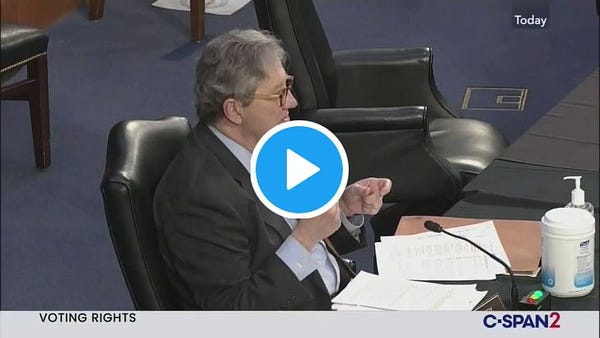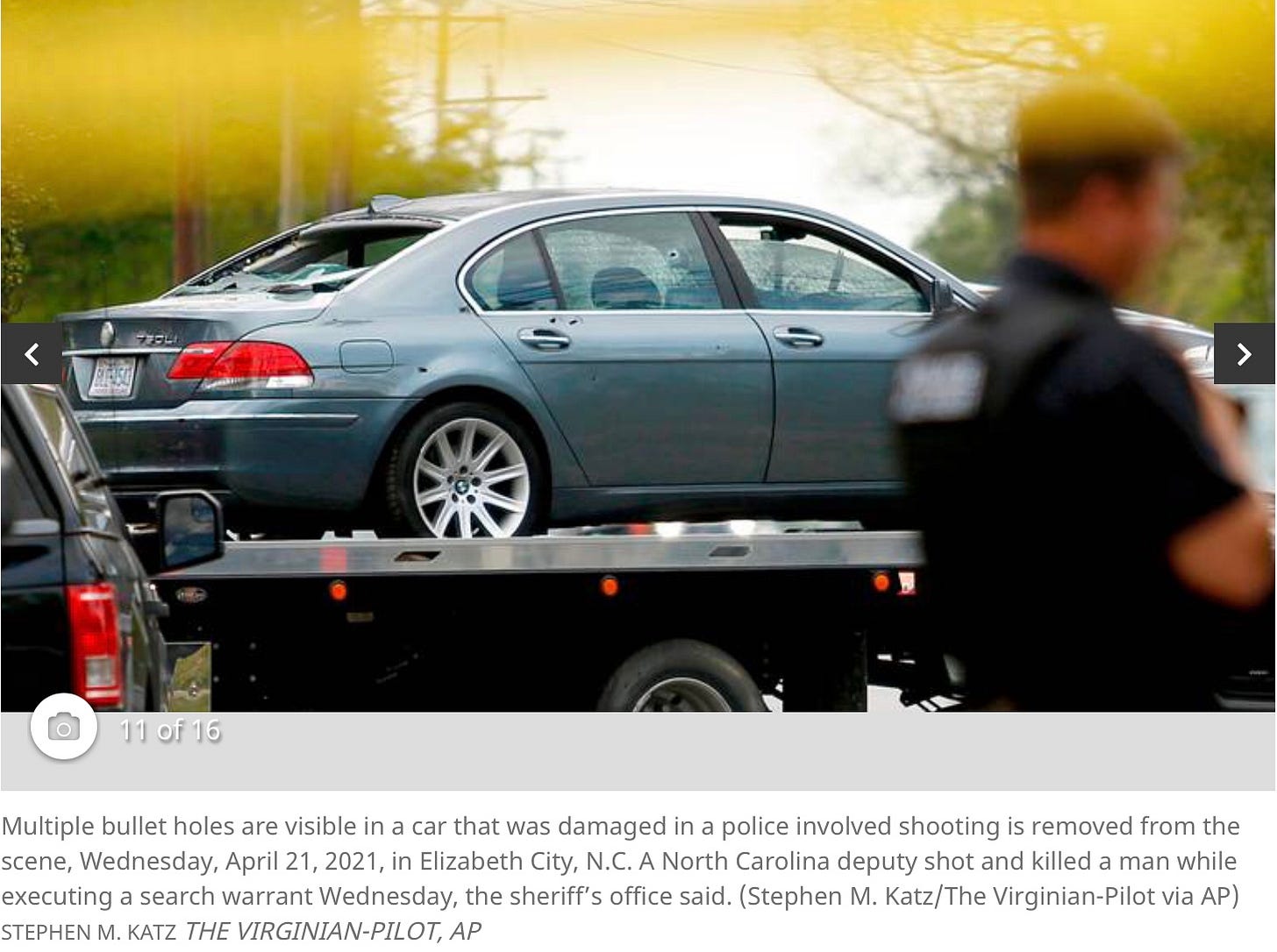Andrew Brown’s Death Looks Very, Very Bad
A Black man, shot in his car from behind, no explanation given + Cooper wants us to get vaccinated, party like it’s January 2020 + how to turn Alamance (and NC) blue
Thurs., April 22, 2021
Yesterday was what you might call A Day. I’m rounding second on one very large, complex, migraine-inducing feature while getting started on a shorter, annoying one that I—a bad freelancer in desperate need of a personal assistant and/or a clone—forgot I’d agreed to do a month ago.
None of that affects you, other than that this is going to be a speed-read edition of PRIMER.
Random request: If any of you are physicians or work in a doctor’s office, please shoot me an email. I need some help with a short, annoying story. (You don’t need to be quoted if you don’t want to.)
Scuttlebutt: Remember former Raleigh city manager Ruffin Hall, who retired at the end of last year? He just launched a consulting firm with Curt Walton, whom he previously worked with in Charlotte.
Weather: Partly cloudy and cool. High of 60.
Today’s Chart
Those are vehicles sold globally in 2020.
Tesla’s market cap is currently $714 billion.
H/t: Zack Stanton
Today’s Lesson
Don’t ask a question if you don’t want the answer.


+TODAY’S TOP 3
1. Cooper: COVID Restrictions End June 1, If You Behave
Such a tease, this guy.
Fourteen months after our lives were upended by the pandemic, Governor Cooper says he “anticipates” that almost everything will go back to normal on June 1: restaurant and bar capacity limits, entertainment venues, the outdoor mask mandate, the works. We can party like it’s January 2020, which was approximately 26 years ago.
The one thing that won’t revert to the status quo ante: the mask mandate, indoors. That, says Cooper and DHHS Secretary Mandy Cohen, will have to wait until two-thirds of the state gets at least one vaccine dose.
Cohen: “This is where North Carolinians really need to roll up their sleeves, literally, and to help us get to that goal. And once we are able to get to that goal, we can further ease mask mandates and other public health guidance.”
“Cohen said there will be ongoing safety recommendations in large venues and places where there are children under 16, who are not yet eligible for vaccinations. She said masks will still be an important tool to stop the spread of the coronavirus. She expects masks to remain part of safety protocols for children at schools and summer camps, for example.” (N&O)
Cooper “said he thinks it will be hard to reach the two-thirds threshold by the end of May and anticipates the target being reached shortly thereafter. More than 47% of adults have gotten at least one shot, and nearly 36% are fully vaccinated.” (AP)
Cooper’s existing executive order expires on April 30. He said yesterday he’ll issue one covering May next week.
Yeah, but: As we discussed yesterday, the issue will be getting enough vaccine-skeptical Trump supporters to take their shots to hit that threshold.
North Carolina now has more supply than demand.
Cooper’s announcement was greeted with plenty of tweets like this:


▶️ OTHER STATE NEWS
Republicans in the state House are pushing a bill to require cellular providers to provide location information “upon request of the highest ranking person on duty”—i.e., no warrant necessary—but “only in an emergency situation that involves an imminent risk of death or serious physical harm,” which, of course, the cops would never abuse. By one vote, the House rejected an amendment that would require law enforcement to go before a judge and justify the request within three days of receiving the information. (WRAL)
2. Pasquotank Sheriff’s Deputy Kills Black Man
We’re early days here, but this looks bad. Very, very bad. At about 8:30 a.m. yesterday, Pasquotank County (about two hours northeast of Raleigh) sheriff’s deputies went to serve a search warrant in Elizabeth City. Details are scarce, but:
Andrew Brown Jr., a 40 (or 42)-year-old Black man, “got into his car and started to drive away, witnesses said. That’s when shots were fired by the deputy. Neighbors said they heard anywhere from six to eight shots. His family said Brown did not carry a gun and didn’t hurt anyone. He was the father of 10 children.” (WAVY)
“Authorities wouldn’t provide details of the shooting but an eyewitness said that Andrew Brown Jr. was shot while trying to drive away, and that deputies fired at him multiple times. The car skidded out of Brown’s yard and eventually hit a tree, said Demetria Williams, who lives on the same street. Williams said after hearing one gunshot, she ran outside, where she saw other shots being fired at the car. ‘When they opened the door he was already dead,’ Williams told The Associated Press. ‘He was slumped over.’”
“A car authorities removed from the scene appeared to have multiple bullet holes and a broken rear windshield.” (AP via WaPo)
There is body-cam footage, but it hasn’t been released. The cops haven’t said what the warrant was for. (You can’t bet that if either of those things made the deputies look good, they’d be public by now.)
If the deputy shot the car from behind—and, yeah, they did, from the back right and behind, it looks like (see below)—and if Brown was unarmed and fleeing—it’s hard to imagine the sheriff not announcing if they found a gun in the car—then it’s difficult to see how this was a good shoot.
The question: What happens next?
▶️ OTHER POLICE SHOOTING NEWS
Officials in Columbus, Ohio, released body-cam footage of Tuesday’s fatal police shooting of Ma’Khia Bryant, a 16-year-old Black girl killed just as the verdict in the Derek Chauvin trial was announced.
In a series of clips from police body camera video, the girl is seen holding a knife during a tussle with another young woman. An officer arrived at the scene and opened fire when the girl appeared to attempt to stab a second woman.
“She's a ---- kid,” a man at the scene tells the officer after four shots were fired. “Damn, are you stupid.”
Ma’Khia fell to the ground, the knife by her side.
“She came at her with a knife,” the officer who fired his weapon is heard saying.
The situation unfolded rapidly, according to clips from the body cameras of three officers on the street. Ma'Khia was holding a knife in her right hand and charged a woman dressed in pink—who turned to her side as the teen appeared to attempt to stab her. That’s when the shots rang out.
The Columbus police officer who fatally shot 16-year-old Ma’khia Bryant on Tuesday during a chaotic encounter involving a knife appears to be a military-trained marksman and son of the department’s longtime basic training sergeant. …
Police said the incident began around 4:32 p.m. on Tuesday when officers received two 911 calls about an attempted stabbing. In the first call, a female voice can be heard giving the dispatcher an address and saying people were “over here trying to fight us, trying to stab us, trying to put their hands on our grandma.” Screaming can be heard in the background. … It was unclear if the caller was Bryant, as an aunt told reporters on Tuesday evening.
The initial body-cam video was released Tuesday night after Bryant’s family members spoke to reporters and accused authorities of killing a girl who was just trying to defend herself. Donnie Bryant, one of the teenager’s cousins, told The Daily Beast that the family is “absolutely shocked” by the footage of Tuesday’s shooting and wants “justice.”
The video is “very disturbing. As a former city council member, I know first-hand there are de-escalating tactics that could have been used in this situation. You don’t have to pull out your gun and kill a 16-year-old,” Bryant said.
Hundreds of people protested in downtown Columbus last night.
Meanwhile, in Washington: On Monday, House Speaker Nancy Pelosi modified her proposal for a commission to investigate the Jan. 6 insurrection on the Capitol. She had originally wanted seven Democrats and four Republicans—perhaps on account of Republicans, you know, being in league with the insurrectionists—but said she’d be willing to split the commission evenly.
Not good enough, Republicans said, in absolutely good faith.
The commission to investigate the Jan. 6 coup must also—because reasons—investigate the Black Lives Matter protests from the previous summer, too.
3. Read Me: How to Turn Alamance Blue
Barry Yeoman is out with a new piece in The Assembly profiling Ricky Hurtado, whose unusual campaign for state representative in 2020 might light the path for a new generation of Democrats—if the party’s willing to listen.
As a rule, always read Barry Yeoman.
When Ricky Hurtado launched his state legislative campaign in November 2019, the kickoff party signaled a new kind of Democratic politics for North Carolina. For starters, there was the menu: trays of pupusas and Mexican sweet bread, washed down with pale ale and fruity Jarritos sodas.
It was an overheated crush of bodies that night, inside a Burlington real-estate office with mismatched furniture and exposed brick. Educators, racial-justice activists, old friends, and politicians took turns at a selfie station, where they posed with the candidate and held signs saying, “#BlueWave” and “Sí Se Puede.”
“The place was packed, just packed, and it looked like North Carolina,” recalled Irene Godínez, executive director of Poder NC Action, which does leadership development with young Latinxs. “It was queer folks, straight, Black, brown, men, women. It was just what North Carolina looks like to me.”
At the center stood Hurtado, co-founder of the educational-equity group LatinxEd. Thirty at the time, with a goatee and oversized dimples, he was hoping to unseat Republican Rep. Stephen Ross in Alamance County’s House District 63. But for those at the kickoff, the stakes felt higher than a single legislative seat. Hurtado’s parents had fled El Salvador’s civil war in 1980, and he was running at the very moment that North Carolina, and the country, were riven by the debate over immigration. He represented next-generation North Carolina: educated and multilingual, nimble at moving through diverse communities, justice-minded and policy-driven. If his candidacy seemed like a threat to conservatives who prefer their border walls tall and strong, it also threatened moderate Democrats who like their politicians white, Tar Heel-born, and ideologically cautious.





